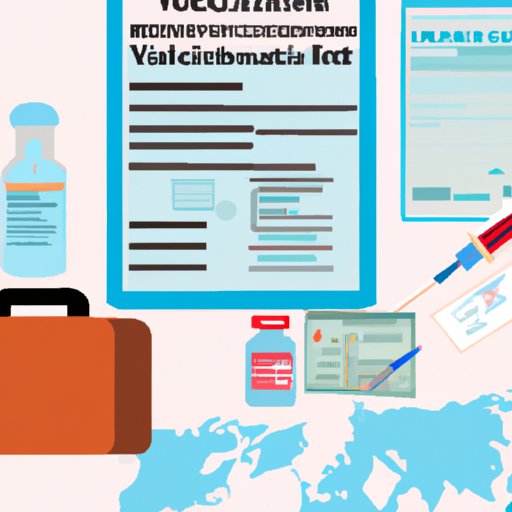Introduction
Traveling is an exciting experience that can bring you a lifetime of memories. However, it’s important to make sure you’re taking the necessary precautions to protect yourself from any potential health risks when going abroad. This includes getting vaccinated for certain diseases and illnesses, depending on where you’re traveling. Vaccines are one of the most effective ways to prevent infectious diseases and can help keep you safe while you explore the world.
In this article, we’ll discuss the importance of being vaccinated prior to travel, the types of vaccines needed for different destinations, how to find a reliable health care provider for vaccinations, the risks associated with not being properly vaccinated, the documentation required to prove vaccination, how to store your vaccination records safely, and how to obtain a certificate of vaccination.

Finding a Reliable Health Care Provider
The first step in proving vaccination for travel is finding a reliable health care provider. It’s important to research and find a provider who specializes in travel medicine and can provide you with the necessary vaccines based on your destination. You should also check with your primary care physician to see if they offer travel vaccinations or can refer you to a provider who does.
The Centers for Disease Control and Prevention (CDC) recommends consulting a healthcare provider at least four to six weeks before you travel, as some vaccines may take several weeks to become fully effective. This will give you enough time to get the necessary shots and for them to take effect before your departure date.

Risks Associated with Not Being Properly Vaccinated
Dr. Amesh A. Adalja, senior scholar at the Johns Hopkins Center for Health Security, emphasizes the importance of being properly vaccinated prior to travel. “Vaccines are the best way to reduce the risk of acquiring infections while traveling,” says Adalja. “It’s essential to consult with a doctor or other healthcare provider who has expertise in travel medicine to determine which vaccines are needed.”
Not being properly vaccinated can put you at risk of contracting serious and potentially life-threatening illnesses, such as cholera, yellow fever, and meningitis. The World Health Organization (WHO) estimates that more than two million deaths are prevented each year due to vaccinations.

Documentation Required to Prove Vaccination
Once you’ve been vaccinated, it’s important to keep the documentation of your immunization records in case you need to prove your vaccination status. Depending on the country you’re traveling to, you may be required to show proof of certain vaccinations to enter the country. Your health care provider should provide you with documentation of the vaccines you received. This documentation should include the date of the vaccinations, the type of vaccine, and the manufacturer of the vaccine.
Storing Vaccination Records Safely
Once you have your vaccination records, it’s important to keep them in a safe and secure place. You may want to consider making digital copies of your records and storing them on a secure cloud service or an encrypted USB drive. This way, you’ll always have access to your records in case you need to prove your vaccination status.
Obtaining a Certificate of Vaccination
In some cases, you may need to obtain a certificate of vaccination in order to enter a country. This certificate is an official document issued by a health care provider or government agency that confirms you have been vaccinated against certain diseases. Depending on the country you’re traveling to, you may be able to obtain a certificate of vaccination online, or you may need to contact the country’s embassy or consulate in order to obtain the certificate.
Conclusion
Getting vaccinated prior to travel is essential for protecting yourself from serious and potentially life-threatening illnesses. It’s important to consult with a health care provider who specializes in travel medicine to determine which vaccines are necessary for your destination. Additionally, you should keep your vaccination records in a safe and secure place and obtain a certificate of vaccination if necessary. By following these steps, you can ensure you’re taking the necessary precautions to stay healthy and safe while traveling.
(Note: Is this article not meeting your expectations? Do you have knowledge or insights to share? Unlock new opportunities and expand your reach by joining our authors team. Click Registration to join us and share your expertise with our readers.)
